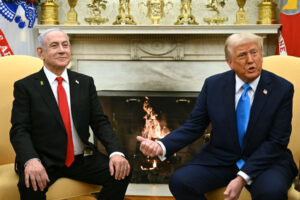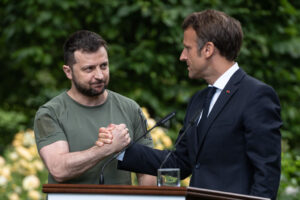Odesa’s historic city centre remains under daily Russian bombardment. Each night, we wake to news of yet another drone or missile attack. But so far the air defences, like Ukraine, hold out. And the yellow and blue flags fly defiantly from the city buildings.
Everyone wants to talk about Donald Trump, possible US betrayal and whether there really is now an end in sight to this war. Confusion reigns, with Trump reacting belligerently to Putin’s suggestion of an interim government. He says he’s “very angry” and has again lashed out with the threat of tariffs. The President might promise peace, but the lines coming out of Kyiv, Washington and Moscow are consistent only in their acrimony and confusion.
Ukrainians remain shocked at Trump’s behaviour. They cannot understand why he humiliated their president (only improving Zelensky’s popularity at home); they cannot understand why he parrots Kremlin propaganda (the latest being his claim that Ukrainian forces are surrounded in Kursk when they obviously are not). And, above all, they cannot understand why he has wanted to embrace Putin, a man who so clearly despises the United States.
Last week, though, following separate meetings with each side in Riyadh, the White House announced it had brokered a deal between Moscow and Kyiv to halt fighting in the Black Sea. This is a more limited agreement than the ambitious one discussed weeks ago in Jeddah. And the situation remains complicated. From the outset, Russia insisted that for any halt in hostilities it must get sanctions relief. It wanted its access to the SWIFT payment network restored and general banking sanctions lifted. Last Tuesday, the US agreed to this in exchange for a limited Black Sea deal. But then, on Thursday, a European summit in Paris declared there will be no lifting of sanctions — European buy-in essential for any deal to progress.
So what we have is another Trump-induced diplomatic mess. According to former Ukrainian Defence Minister Andriy Zagorodnyuk, things are at a stalemate. “We believe the Russians still have sufficient capability to put pressure on us, but not enough to make any serious breakthrough,” he tells me. “We don’t have enough to break through from our side either. No one can move any further.”
If the Russians don’t have the numbers to break through the Ukrainian lines they can, of course, mobilise yet more people, but this is not without a political cost, even for Putin. Moscow’s last mobilisation was difficult. Thousands fled the country to dodge the draft, and Russia started signing people up from other countries. Despite this, they’re still attempting to build their reserves.
“They’re getting ready for another summer offensive, which will be difficult for us,” Zagorodnyuk says. “We have defensive power, so their offense won’t be as productive, but it won’t go unnoticed. But if they want to launch an offensive, this is the right time. The weather is ideal — it’s around 16°C now, which is perfect for their preparations.”
Given that the offensive hasn’t come, Zagorodnyuk wonders if their preparations haven’t gone to plan. Certainly nothing has changed in terms of their strategy. “Their goal remains eradicating and destroying Ukraine,” he added.
As it stands, both sides need some form of respite, even if only temporary. Neither country’s economy is doing well and both militaries are exhausted. “They also have production problems,” adds Zagorodnyuk. “So they can’t ramp up production quickly enough to replace lost assets. If they’re put in a difficult position, they may go for a ceasefire, but they need to be in a very specific position for that. So, to expect them to agree to a ceasefire just because Trump asks them to — it’s not going to happen.”
But Trump can pressurise Putin in several ways. First, he could give Ukraine the weapons it’s been requesting. These would include the missiles, real-time intel, long-range aviation, and the communication systems that Zelensky laid out in his victory plan for Biden. He could also drastically intensify sanctions — cutting off most of the international banking system from trading with Russia and targeting its oil trade. Biden didn’t want to do either of those. His approach was never full-throated.
Trump has now actually started talking about doing these things, hoping to bring Putin to the table. His threats to impose secondary tariffs on all oil coming out of Russia if Putin does not agree to a ceasefire suggest that he might be finally running out of patience. Perhaps the White House has realised that it can’t work with Putin, and that Trump can’t get him to behave equitably and honestly. But Putin will want to keep at least a charade of negotiations going. Partial ceasefires, shifting the goalposts, complaints, new proposals: this is the Russian negotiation playbook. We saw it play out from 2014-2020 with the Minsk Process, a series of ceasefires that never came close to ending the war (that began in 2014 not 2022) or stopping Russian aggression.
For now, then, Trump remains the ultimate variable. Say what you like about Putin, but he is at least consistent in his barbarism. Trump’s malice is compounded by whimsy. Before his most recent pivot away from Putin, he changed once again the terms of the deal by which Ukraine would give Washington a share of its huge mineral resources. Washington’s latest demand is for all of Ukraine’s natural resources income for years: Kyiv to send Washington all profit from a fund controlling Ukrainian resources until all American wartime aid was repaid, plus interest. Obviously, Ukraine cannot accept this, which allows Trump to blame Zelensky for being an obstacle to peace.
This all looked good for Putin previously, but as Zagorodnyuk cautions, you can never be sure. “Putin will just blame Ukraine for everything, so the question remains who will Trump decide to push, Ukraine or Russia. You never know with Trump.” So though life continues in Odesa, uncertainty, as ever, rules.
Disclaimer
Some of the posts we share are controversial and we do not necessarily agree with them in the whole extend. Sometimes we agree with the content or part of it but we do not agree with the narration or language. Nevertheless we find them somehow interesting, valuable and/or informative or we share them, because we strongly believe in freedom of speech, free press and journalism. We strongly encourage you to have a critical approach to all the content, do your own research and analysis to build your own opinion.
We would be glad to have your feedback.
Source: UnHerd Read the original article here: https://unherd.com/




